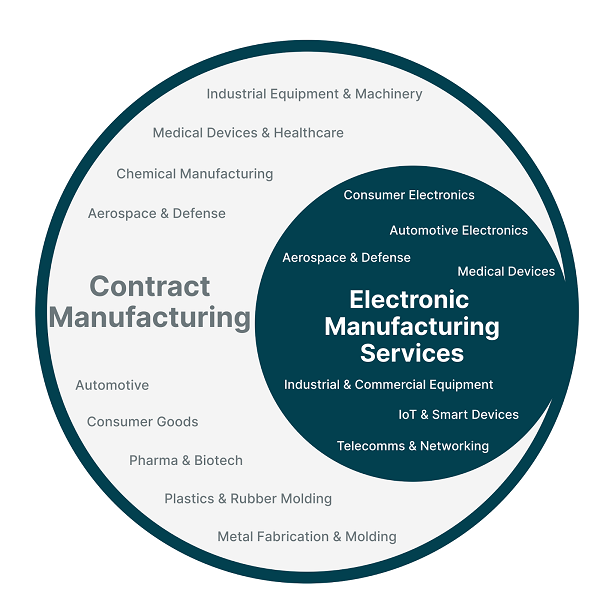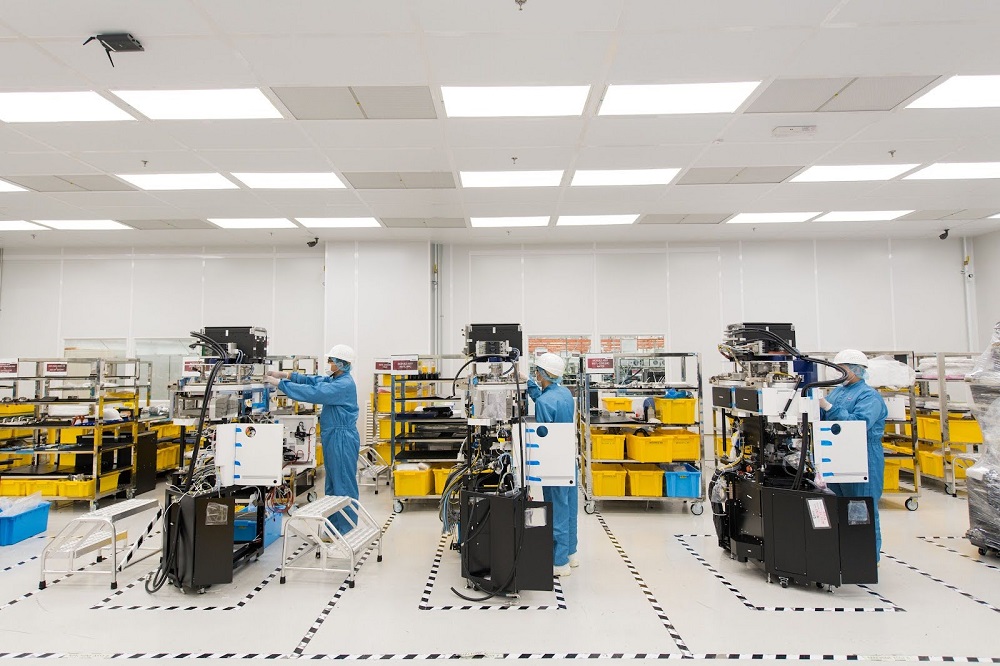Contract Manufacturing & EMS: Product Journey Overview

- Defining the Landscape: Contract Manufacturing vs. Electronic Manufacturing Services (EMS)
- Strategic Value & Benefits for OEMs
- Key Services & Processes Offered
- Industry Focus & Specialized Needs
- How to Select the Right Partner
- Frequently Asked Questions (FAQs) About Contract Manufacturing & EMS
- Conclusion
Contract manufacturing plays a critical role in the creation of many of today’s electronic products, from smartphones to life-saving medical devices. Within the contract manufacturing landscape, Electronic Manufacturing Services (EMS) is a pivotal, specialized term. While contract manufacturing and EMS are often used interchangeably, understanding their nuances is key for businesses aiming to optimize production and accelerate time to market.
This overview clarifies the concepts of contract manufacturing and EMS. It details their strategic advantages, outlines the services each offers, highlights specialized industry needs and provides a roadmap for choosing your ideal manufacturing partner.
Defining the Landscape: Contract Manufacturing vs. Electronic Manufacturing Services (EMS)
What is Contract Manufacturing?
Contract manufacturing is a business model where an Original Equipment Manufacturer (OEM) hires a contract manufacturer (CM) to produce goods or components precisely to the OEM’s designs and specifications. While the CM’s primary role is production execution, this model applies across many industries, extending beyond electronics.
What are Electronic Manufacturing Services (EMS)?
EMS is a specialized subset of contract manufacturing. It focuses exclusively on the intricate processes involved in the designing, manufacturing and servicing of electronic components. While often used interchangeably with Electronic Contract Manufacturing (ECM), EMS specifically denotes a deeper, more integrated suite of services tailored to the unique complexities of electronics.
The Relationship: EMS as a Specialized CM
Contract manufacturing is the overarching category for outsourced production. EMS falls under this umbrella, representing contract manufacturing specifically for the electronics industry. Every EMS provider is a CM, but not every CM possesses the specialized expertise, technology and compliance capabilities required for advanced electronic manufacturing.

Strategic Value & Benefits for OEMs
Engaging with a CM or EMS provider offers compelling strategic advantages:
- Focus on Core Competencies: OEMs can dedicate resources to research & development, innovation and brand building, free from manufacturing complexities.
- Cost Efficiency:
- Reduced Capital Expenditure: OEMs avoid significant upfront investment in factories, machinery and production lines.
- Economies of Scale: Because they produce for multiple clients, CMs and EMS providers can buy raw materials and components in bulk, securing better prices.
- Lower Operational Overheads: OEMs benefit from the CM’s optimized processes, experienced labor and existing global infrastructure.
- Speed to Market:
- Accelerated New Product Introduction (NPI): Expert CMs and EMS providers such as Plexus streamline processes from prototype to full-scale production.
- Faster Prototyping: Dedicated resources enable rapid prototype builds, accelerating design validation.
- Access to Specialized Expertise & Advanced Technology:
- CMs and EMS providers continually invest in cutting-edge equipment that drive manufacturing efficiency and quality.
- These partners provide advanced engineering services such as Design for Excellence to optimize products for scale production.
- They also provide OEMs access to sophisticated capabilities like SMT lines or cleanroom manufacturing, which might be too costly to maintain in-house.
- Scalability & Flexibility: A key benefit is the ability to quickly ramp production up in response to fluctuating market demand, offering dynamic adaptability.
- Risk Mitigation: Partnering with an experienced CM or EMS provider diversifies manufacturing risk, leverages their robust global supply chains and taps into their expertise in navigating complex regulatory landscapes.

Key Services & Processes Offered
Modern CMs, especially EMS providers, offer comprehensive services across the entire product life cycle:
- Design & Engineering Support: Offering comprehensive product development expertise, including: user research, full product strategy and design, Design for Excellence (DFX) reviews, and test strategy and development services.
- New Product Introduction (NPI) & Prototyping: Facilitating the transition from design to mass production through rapid prototyping, supply chain development, process validation and ramp to volume production.
- Supply Chain Management: Overseeing the entire material flow, encompassing: Global component sourcing; turnkey procurement; inventory management (JIT, VMI); obsolescence mitigation; and global logistics.
- Manufacturing & Assembly:
- Printed Circuit Board Assembly (PCBA): Precision assembly of printed circuit boards utilizing Surface Mount Technology (SMT) and Through-Hole (THT) processes.
- Box Build Assembly: Comprehensive final product assembly involving the integration of PCBs with enclosures, wiring, and user interfaces; and final testing.
- Specialized Manufacturing: Niche production capabilities such as cleanroom assembly, precision machining, molding and custom wire/cable harness fabrication.
- Testing & Quality Assurance: Ensuring product reliability and compliance through rigorous multi-stage testing (e.g., AOI, X-ray, ICT, Functional Testing) and adherence to strict industry quality standards (e.g., IPC, ISO certifications).
- Aftermarket & Sustaining Services: Providing comprehensive post-production support including repair and rework, refurbishment, returns management (reverse logistics), product upgrades and lifecycle management.
- Regulatory & Compliance Expertise: Guiding and ensuring that products meet stringent industry-specific regulations (e.g., FDA for medical devices, AS9100 for aerospace, RoHS/REACH directives).

Industry Focus & Specialized Needs
While general contract manufacturing serves a wide range of industries, EMS caters specifically to sectors demanding highly complex, high-reliability electronic products such as:
- Healthcare & Life Sciences: Manufacturing life-saving medical devices, diagnostic instruments and therapeutic equipment, requiring compliance with ISO 13485 and FDA regulations.
- Aerospace & Defense: Building avionics, communication systems and ruggedized electronics that require AS9100 certification and ITAR compliance.
- Industrial & Automation: Producing control systems, robotics and test and measurement equipment where precision and durability are critical.
- Telecommunications & Networking: Manufacturing infrastructure components for 5G, data centers and communication networks.
- IoT & Connected Devices: Enabling smart technologies, often requiring advanced miniaturization and wireless integration.
Specialized EMS providers like Plexus excel in meeting the demands of high complexity, miniaturization, advanced materials and intricate system integration, offering expertise few OEMs can manage in-house.

How to Select the Right Partner
Selecting a contract manufacturing partner, particularly an EMS provider, is a pivotal strategic decision. Consider the following:
- Expertise & Capabilities: Proven experience in your industry, product complexity and necessary technological capabilities.
- Quality Standards & Certifications: Relevant ISO, industry-specific and regulatory certifications.
- Scale & Flexibility: Ability to support current and future production volumes.
- Global Footprint: Manufacturing facilities and supply chain networks in strategic locations.
- Communication & Partnership Model: Emphasize collaboration, transparency and acting as an extension of your team.
- Value: Evaluate total cost of ownership, considering value added through quality, risk reduction and speed.
- Aftermarket Support: Robust post-launch services to protect your product investment.
Frequently Asked Questions (FAQs) About Contract Manufacturing & EMS
To further clarify, here are answers to some common questions OEMs have about contract manufacturing & EMS:
When should an OEM consider partnering with an EMS provider?
When they need to reduce capital expenditure, require specialized expertise/advanced technology, want to accelerate time-to-market, need rapid production scaling, require global manufacturing or operate in highly regulated industries.
Do EMS providers handle product design, or just manufacturing?
The approach will vary depending on the EMS provider. Many offer extensive design and engineering support services (like Design for Excellence reviews). Larger EMS providers such as Plexus can offer full product design services, becoming true partners in bringing products to life.
How does an EMS provider ensure the quality of outsourced electronic products?
Reputable EMS providers employ rigorous quality assurance, including advanced testing (AOI, X-Ray, ICT, functional testing), adherence to international standards and robust supply chain management.
Can an EMS provider manage global production and logistics?
Yes, leading EMS providers like Plexus have extensive global footprints, managing complex global logistics and providing regional production capabilities to meet customer needs worldwide.
Conclusion

Contract manufacturing serves as the backbone of global production, enabling companies to bring diverse products to market more efficiently. EMS stands out as the highly specialized, high-tech arm dedicated to electronic product development and launch.
Choosing the right CM or EMS partner is not merely about outsourcing production; it’s about securing a long-term partner who can drive innovation, ensure uncompromising quality, manage global complexities and accelerate your path to market success. These strategic partnerships with leading EMS providers are precisely what enable breakthroughs across vital industries.
At Plexus, our reputation as a leading EMS provider is built on our commitment to being your trusted partner of choice in bringing products to life, helping your innovations achieve unmatched quality and efficiency. Our global engineering, manufacturing and servicing expertise delivers the speed, flexibility and resilient supply chains necessary for unwavering quality in the most demanding industries. We drive this through our collaborative partnerships and dedication to delivering excellence, further enhanced by our global reach and local expertise.
Contact Plexus
Ready to transform your path to market success? Contact us today to discuss how our expertise can bring your electronic products to life.
- Defining the Landscape: Contract Manufacturing vs. Electronic Manufacturing Services (EMS)
- Strategic Value & Benefits for OEMs
- Key Services & Processes Offered
- Industry Focus & Specialized Needs
- How to Select the Right Partner
- Frequently Asked Questions (FAQs) About Contract Manufacturing & EMS
- Conclusion


